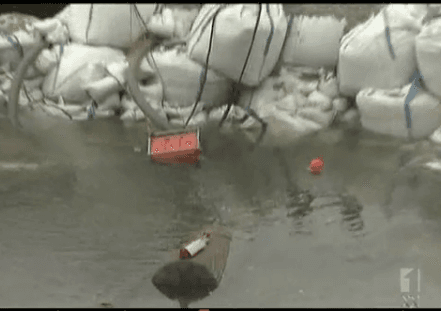VIDEO: Two massive World War II bombs defused in Koblenz, Germany
A large, 2-ton bomb, pictured at center, was discovered when the water level on the Rhine River fell during November. It was defused over the weekend.
Nearly 50,000 people were evacuated from the German city of Koblenz over the weekend, while bomb disposal experts worked to disarm two World War II-era bombs discovered in the Rhine River.
About half the city was evacuated, for fear that in the process of disarming the ancient devices, they might detonate. One of them was a British bomb weighing nearly two tons, the other a smaller American bomb that were uncovered after a drier than normal November lowered the water level of the river.
“Everything is closed, the cafe’s and everything. You can’t go anywhere,” said one resident.
Included among the evacuees were nursing home residents, hospital patients and inmates at a local jail. They were all taken to temporary shelters until the bomb disposal experts successfully completed their work.
“It feels a bit strange,” another evacuee said from the shelter. “I left home, closed all the windows and let down the roller shutters.”
Volker Grabe, of the German Red Cross, said his group helped evacuate private residences as well as retirement homes, where senior citizens may be unable to leave without help.
About 1 in 10 bombs dropped on Germany during World War II failed to explode. Germans regularly uncover unexploded ordinance, though the two bombs found in the Rhine are the largest to be discovered since 1945.
Marco Ofenstein, a bomb dispoal expert, said that the biggest risk with these bombs was the fact the detonator had been immersed in water for more than 60 years.
“It causes a high risk when the detonator is being removed,” he said.
A half-dozen people have died in recent years while either trying to defuse unexploded ordinance or when coming into contact with it unintentionally.
Our coverage reaches millions each week, but only a small fraction of listeners contribute to sustain our program. We still need 224 more people to donate $100 or $10/monthly to unlock our $67,000 match. Will you help us get there today?
